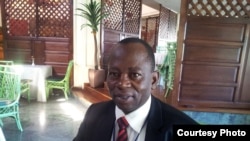ACCRA, GHANA —
West Africa is in dire need of electrical power for industrial production and home consumption because increased public demand poses a threat to regional economic growth and development. But the region is said to be naturally endowed with renewable energy resources which could be tapped for the benefit of its 300 million inhabitants.
Mahama Kappiah is executive director at the Centre for Renewable Energy and Energy Efficiency (ECREEE) of the Economic Community of West African States (ECOWAS). He said access to modern energy services can increase job creation and reduce poverty levels especially in rural areas. Kappiah said developing renewable energy resources could boost energy production in the region.
“The region (Africa) boasts of 23,000 megawatts of exploitable hydro resources of which we (ECOWAS) have exploited less than 20 percent. We have woodlots and forest areas. All these can be exploited to produce energy to improve our economies in the region”.
So far, 730 projects covering biomass, wind, solar and hydropower have been identified by ECREE for possible development. Thirty-five of these have reached different levels of maturity and are making an impact on people’s lives.
One example is a solar photo-voltaic plant in Cape Verde. The project said to be the largest of its kind in Africa and covers over 13 hectares of land with a capacity of 7.5 megawatts of power. Kappiah said an additional wind power project is helping the country to save on fuel imports.
“Before this plant was constructed, power interruption was like any other country in the region. Today, it has become a lot more stable and the government has saved so much. If from 2008, the penetration of renewable was almost zero, today, they (Cape Verde) have 25 percent renewable energy penetration. The government presently is carrying out a study for 100 percent renewable by 2030.”
Kappiah said operating renewable energy plants may involve higher cost at the initial stages. However, it becomes cheaper over time while creating benefits such as energy security, reliability and flexibility.
President Barack Obama recently announced a U.S. $7 billion initiative to improve electricity in Africa. The objective of “Power Africa” is to provide over 10,000 megawatts of clean energy over a period of five years.
Kappiah said the plan would help to attract needed funds for more renewable energy projects for the West Africa region.
Mahama Kappiah is executive director at the Centre for Renewable Energy and Energy Efficiency (ECREEE) of the Economic Community of West African States (ECOWAS). He said access to modern energy services can increase job creation and reduce poverty levels especially in rural areas. Kappiah said developing renewable energy resources could boost energy production in the region.
“The region (Africa) boasts of 23,000 megawatts of exploitable hydro resources of which we (ECOWAS) have exploited less than 20 percent. We have woodlots and forest areas. All these can be exploited to produce energy to improve our economies in the region”.
So far, 730 projects covering biomass, wind, solar and hydropower have been identified by ECREE for possible development. Thirty-five of these have reached different levels of maturity and are making an impact on people’s lives.
One example is a solar photo-voltaic plant in Cape Verde. The project said to be the largest of its kind in Africa and covers over 13 hectares of land with a capacity of 7.5 megawatts of power. Kappiah said an additional wind power project is helping the country to save on fuel imports.
“Before this plant was constructed, power interruption was like any other country in the region. Today, it has become a lot more stable and the government has saved so much. If from 2008, the penetration of renewable was almost zero, today, they (Cape Verde) have 25 percent renewable energy penetration. The government presently is carrying out a study for 100 percent renewable by 2030.”
Kappiah said operating renewable energy plants may involve higher cost at the initial stages. However, it becomes cheaper over time while creating benefits such as energy security, reliability and flexibility.
President Barack Obama recently announced a U.S. $7 billion initiative to improve electricity in Africa. The objective of “Power Africa” is to provide over 10,000 megawatts of clean energy over a period of five years.
Kappiah said the plan would help to attract needed funds for more renewable energy projects for the West Africa region.













